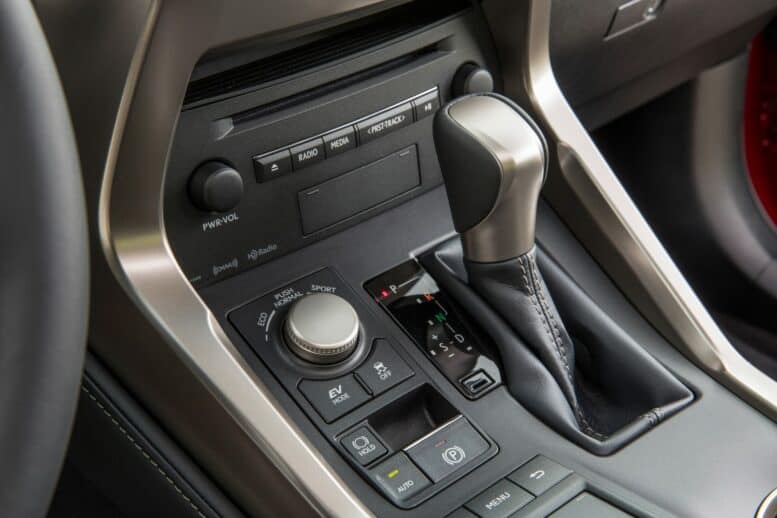Are you familiar with Lexus NX 300h problems?
The Lexus NX 300h is a luxury mid-size crossover SUV manufactured by the Toyota Motor Corporation and marketed under its Lexus luxury brand.
It is available in both front-wheel and all-wheel drive configurations and has been on the market since 2014.
The NX 300h is powered by a standard 2.5-liter 4-cylinder gasoline engine coupled to two electric motors and a continuously variable transmission (CVT).
It offers a combined output of 194 horsepower and is capable of achieving an estimated EPA-rated fuel economy of 33 mpg combined [1].
The car also comes with luxury standard safety and driver assistance features. These include lane departure warning, rear cross-traffic alert, adaptive cruise control, and blind spot monitoring.
The vehicle also features a leather-wrapped steering wheel and shift knob, heated and ventilated front seats, a power moon roof, and a 7-inch touchscreen infotainment system.
Despite its many advantages, the SUV does have a few common problems that can affect its performance and reliability. This article will discuss the most common Lexus NX 300h problems and potential solutions to the problems.
Lexus NX 300h Problems

The Lexus NX 300h is a reliable vehicle. But like any car, it can experience some common problems. The Lexus NX 300h has several common problems that can affect its performance and reliability.
These include issues with the steering system, transmission, engine, brakes, suspension, and electrical system.
Most common Lexus NX 300h Problems

- Power Steering System Issues
The Lexus NX 300h’s steering system may have problems with the steering pump, steering rack, and steering column. The power steering pump can fail due to a lack of maintenance, which can lead to a decrease in power steering fluid pressure.
One known issue is a leak in the power steering fluid, which can cause the steering wheel to become difficult to turn. It may even cause the vehicle to lose steering power [2].
The steering rack and steering column can also become worn, which can cause a clunking noise when turning the steering wheel.
Additionally, some drivers have reported the steering wheel shuddering or jerking when turning the wheel. This problem is often caused by a worn or damaged power steering belt.
In some cases, the power steering pump may fail, which can cause the steering wheel to be slow and unresponsive [3]. Other problems include noise coming from the power steering system, a malfunctioning electric power steering system, or a malfunctioning steering wheel position sensor.
- Transmission Issues
One of the most common complaints about the Lexus NX 300h is its jerky and surging acceleration. This problem is caused by an issue with the vehicle’s continuously variable transmission (CVT).
The transmission is designed to constantly adjust the engine’s power output to optimize fuel economy [4]. However, when the transmission is unable to adjust properly, it can cause the engine to jerk and surge, resulting in a rough and uncomfortable ride.
Other common transmission problems in the Lexus NX 300h are hard shifting and slipping [5]. Hard shifting can be caused by low transmission fluid, worn transmission components, or a faulty transmission control module.
Slipping can be caused by low transmission fluid, a faulty solenoid, or a worn clutch assembly. Surging can be caused by low transmission fluid, a faulty solenoid, or a faulty shift solenoid.
This issue is caused by a problem with the vehicle’s transmission control module (TCM). The TCM is responsible for controlling the transmission’s shifting and clutch engagement.
- Engine Problems
The engine in the Lexus NX 300h can experience problems with the spark plugs, fuel injectors, and timing chain. Spark plug issues might be caused by poor maintenance, or a bad spark plug [6].
Fuel injector issues are usually a result of a faulty fuel injector or a clogged fuel filter.
The timing chain might become stretched, which can cause the engine to misfire. Another frequent problem with the car engine is rough idle. This problem is caused by some factors, including a faulty idle air control valve, or a vacuum leak.
A rough idle may cause the engine to run rough and shake, resulting in decreased performance and fuel economy. The Lexus NX 300h may experience engine overheating due to a faulty thermostat or radiator fan.
- Brake Problems
Brake issues might include a squeaking or grinding sound as well as a lack of responsiveness when the brakes are applied. The main cause of this issue is worn brake pads and rotors, which can be replaced relatively easily.
The brake problems can manifest in a variety of ways. The most common symptom of brake problems is a soft, spongy feeling when the brake pedal is depressed [8].
This can be caused by air or a leak in the brake lines, worn brake pads, or a defective master cylinder.
If the brakes feel soft or spongy, it is important to have them checked and serviced as soon as possible. A technician can inspect the brake lines and master cylinder for leaks, and the brake pads and calipers for wear.
If the vehicle pulls to one side when the brakes are applied, the vehicle should be inspected for uneven tire wear. Uneven wear of tires is caused by several issues, including bent suspension components, worn shocks or struts, or incorrect wheel alignment.
- Electrical System faults
The electrical system of the Lexus NX 300h is one of the most frequently encountered problems. Power windows, headlights, and air conditioning have all been cited as malfunctioning by owners [9].
These issues can manifest in a variety of ways, ranging from minor problems such as flickering dashboard lights or a dead power outlet to more severe issues such as complete electrical failure.
There have been complaints of car batteries depleting quickly and the vehicle failing to start.
This issue is typically caused by a faulty fuse or relay, or a loose connection. The battery also might fail due to age or lack of maintenance. The electrical system also suffers problems with the alternator and starter motor.
Whereas the alternator might fail due to a faulty diode, or a worn belt the starter motor’s failure might be attributed to a faulty solenoid, or a worn starter motor.
The battery should be replaced with a new one. The starter can be replaced as well.
Moreover, the electrical system should be checked for any loose connections or corroded wires. The battery and alternator should also be inspected for any signs of damage or malfunction.
- Suspension Issues
The suspension system of the Lexus NX 300h can be prone to wear and tear over time. One common issue is a loud clunking or knocking sound coming from the rear of the vehicle when driving over bumps or uneven pavements.
The vehicle may experience a noticeable bounce while driving, especially when turning a corner. In some cases, the vehicle may even lean to one side, indicating a misaligned suspension.
Furthermore, the vehicle may feel unstable when driving over rough terrain or may become excessively bouncy, even on smooth roads.
This issue is usually caused by worn shock absorbers, which can be replaced with new ones.
Additionally, the suspension bushings may need to be replaced if they are worn out. This may involve replacing worn suspension components, such as shocks, struts, and control arms, or realigning the suspension system.
Possible Solutions

The greatest way to prevent or solve problems with the Lexus NX 300h is to take it in for regular maintenance. This includes oil changes, tire rotations, and brake system inspections. The transmission will be inspected and serviced if necessary, as well as the airbag system.
The brakes, suspension, and power steering should also be inspected regularly to ensure that they are functioning properly.
To prevent steering system problems in the Lexus NX 300h, check and replace the power steering fluid, and inspect the power steering pump, steering rack, and steering column. [10]
To prevent transmission problems in the Lexus NX 300h, check and replace the transmission fluid, inspect the transmission control module, and replace the transmission filter.
It is also important to have the transmission inspected for worn components, such as the clutch assembly.
For engine problems in the Lexus NX 300h, check and replace the spark plugs, inspect the fuel injectors, and replace the timing chain. In solving electrical system problems, check and replace the battery, and inspect the alternator and the starter motor as well.
Read Also: Lexus IS300h Problems
Conclusion
The Lexus NX 300h is a great luxury mid-size SUV and a reliable vehicle. However, just like any car, it can experience some common issues that impact its reliability and performance.
These issues can range from minor to major, depending on the severity of the problem. Some common issues include brake problems, suspension issues, and transmission problems.
Additionally, the Lexus NX 300h is known to have problems with its electrical system, including the battery and starter. Fortunately, most of these issues can be solved relatively easily with the help of a qualified technician by simply replacing worn parts or components.
But is important to have regular maintenance done to keep your vehicle operational. Common maintenance tasks include checking and replacing fluids and inspecting the steering system, transmission, engine, and electrical system.
With proper maintenance and care, the NX 300h can provide many years of reliable service.
Read Next: Lexus CT200h Problems




